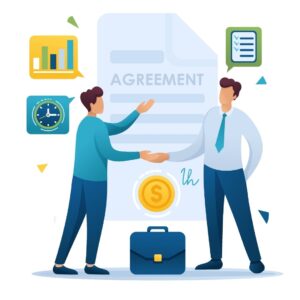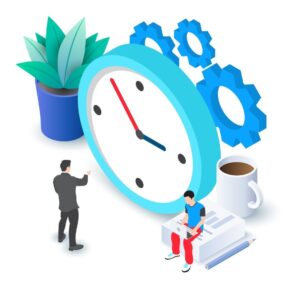Selling is a tough game. There are a lot of obstacles and rejections that mount to a really demoralizing experience. It does not have to be that way. All it takes is developing the right sales skills to break through and reach the success right there in front of you. We are going to show you how to develop the necessary sales skills to succeed.
Why Are Sales Skills Important?
Selling is an art and is perfected through practice. Like anything else, having the right skills add up to developing talent for a specific task. A skilled salesperson enters every conversation with everything they need for success already at their disposal.
Having the right sales skills results in closed deals and more revenue. The more skilled a salesperson is, the more sales they make. Learning the proper sales skills turns an average salesperson into an extraordinary one.
Sales Skills List
Here are some of the sales skills that are most vital. Any serious salesperson should have these key skills in their repertoire.
- Listening
- Communicating
- Storytelling
- Business Judgement.
- Negotiating
- Presentation
- Customer Knowledge.
- Product or Service Knowledge.
- Time Management.
- Prospecting
These Top 10 Sales Skills are Sure to Make a Serious Difference
Listening:
A good salesperson has to be a good listener. Whenever you are interacting with a prospective customer, listen carefully and actively to what they are saying. Customers will reveal their preferences and pet peeves through conversation, so knowing these will immediately help you make a connection with them.
When a salesperson responds directly to a customer it shows that they are listening, which builds trust. Trust is key when forming a relationship between a buyer and a seller. By understanding the customer, you can tailor a presentation that suits their needs and results in a good deal for all parties.
Communication
Selling is not just about listening, it is about communication in general. A salesperson has to make sure that the potential buyer understands them and the product. By developing the ability to clearly explain their product/service, business and the unique benefits of both, a salesperson reduces any ambiguity the buyer might have.
Sales are only made when a buyer is confident that the product or service they are purchasing solves whatever problem they have. Good communication skills are instrumental in gaining the buyer’s attention which will eventually lead to a sale.
Storytelling
Stating a list of facts regarding your product or service might get the point across to a buyer, but it can also lose their attention if the presentation is too dry. When a salesperson develops the skill of storytelling to incorporate into their pitch, it keeps the buyer interested. Stories convey not only the basic premise of the product or service but also help the buyer understand and imagine how they can use it in their own life.
Storytelling can be as simple as giving an example of how the product is used, or it can be more personalized to relate to the specific buyer. Stories help both the buyer and the seller create a picture where the buyer sees the product improving their life, often interjecting with more information to keep the story on track. More information will better help the seller understand what the buyer wants.
Business Prowess
Keeping in mind the general business environment helps a salesperson remain on track towards whatever goal they have in mind. It is easy to lose the forest for the trees when trying to make a sale, so when a salesperson understands the overall business they are a part of it helps them stay focused on the big picture. Salespeople who have a good deal of business prowess have better time management skills and are better able to tell which leads are more beneficial.
The salesperson must understand how much work their business can handle so as to not bite off more than they can chew. Making a deal with the wrong customer can cost the business in the long run, just as ignoring a smaller buyer for a larger one might be the worse choice. Selling with the business in mind will keep sales flowing smoothly.
Negotiating

You do not want to go through a presentation that gets the buyer’s interest and attention just to botch it at the end. A deal can only be made when both parties feel that they are getting some benefit out of it. Presenting the benefits of what you are selling must be done in a way that makes the price feel worth it to the buyer, while keeping the cost of the sale worth it to the seller.
Presentation
Being able to present the product in a professional manner while handling any objections is the only way to make a sale. However, it is not just the pitch that is vital. The seller must present themselves in an orderly manner to create an air of confidence.
Dressing professionally and having respect for the client and the product will go a long way. A buyer needs to know their time is not being wasted, and a professional interaction helps facilitate a sale. The pitch itself should be well-rehearsed and easily understandable.
Customer Knowledge
Understanding the customer is a sales skill that is necessary for the sales process to work. A seller needs to know who their buyers are and why they value the product or service. Having this knowledge gives the seller leverage during the pitch and when handling objections.
Customer knowledge also applies to understanding the buyer’s journey so as to keep their point of view in mind. A buyer wants to know that you are on the same page as them. A good base of customer knowledge helps facilitate communication and helps lead to a sale.
Product/Service Knowledge
It should go without saying that a salesperson needs to understand the product they are selling. Unfortunately, some salespeople are sent into the field unequipped with this knowledge. Buyers can tell immediately when a seller does not fully understand what they are selling.
Lack of knowledge causes a breakdown in the sale and reduces trust in the business. When the seller does not take the time to learn about their product it shows the customer that the product is not worth anyone else’s time, either. Salespeople need to be able to answer any and all questions the buyer may have to instill confidence and trust.
Time Management

Taking too long to make a deal will also lead to a dead sale. Salespeople must do research and make presentations in a timely manner, otherwise, the buyer could change their mind or develop doubts. Salespeople are often in charge of how they use their time, so using it correctly is the key to consistently hitting sales objectives.
Prospecting
Prospecting is the first step in any sales process. A salesperson has to be able to find someone to sell to if they want to close any deals. Finding worthwhile leads quickly can be the difference between making ten sales or making a hundred. Salespeople need to have an understanding of the market, from customers to competition to chase the leads that will result in a sale.
Prospecting does not only involve identifying potential leads but making way to turn those leads into sales. If a salesperson has to push their product too hard to make a sale they are probably pursuing the wrong lead.
These skills take time to develop, but with practice, patience and training any budding salesperson can pick them up. And the results will speak for themselves.
Sales Soft Skills
Many of the above-listed skills are considered soft skills. These sales soft skills are developed and practiced over a lifetime, such as communication and listening skills. Certain soft skills do not necessarily relate directly or exclusively to selling but contain definite benefits for the salesperson who learns them.
Sales Skills and Abilities

Another soft skill is being perceptive towards people’s feelings and reactions. When a salesperson picks up on the subtle nuances that a buyer evokes, they are able to make the right adjustments to their sales practice to keep the buyer interested or refrain from being overwhelming. Sometimes the signs that a buyer is ready to make a deal can be subtle and you never want to oversell risk losing the sale. Working on perceptiveness will allow you to keep the sales flowing.
Assertiveness is another soft skill, along with knowing when to be assertive or passive. Sometimes it takes a little bit of pressure in the right places to get a hesitant buyer to commit to a deal. However, applying pressure at the wrong time can mess up a deal just as quickly.
Assertive behavior can build confidence in both parties. If the buyer thinks the seller is confident, they are more likely to be trusting. When coupled with perceptiveness, assertiveness can be the skill that turns hesitance into excitement.
Improving Sales Skills
The best way to develop any sales skill is to practice. Whether it be through real world experience or rehearsals with other sales team members, paying attention to the kind of tactics you want to incorporate into your sales process is sometimes all it takes to develop those skills.
Sales Skills Training
Working on sales skills can be boiled down to a training regimen for easy development. The best way to learn new skills is to watch a trained salesperson exhibit the skills you want to learn and practice. Businesses can either look from within to have their top sales performers train the others, or hire an experienced outside consultant who knows how to effectively teach those skills to others.
All of the sales skills listed herein are learnable and can always be improved. While some of them are worked on over a lifetime, you can speed up that process by working with someone who has already mastered each specific skill.
The Key Takeaway for Sales Skills
When it comes to the key takeaway from sales skills, you should remember that many sales skills are just life skills applied to selling. They can be practiced and developed in all areas of your life, not just when it comes to selling.
At social events, it always helps to be personable as it helps build friendships and connections. Perceptiveness and communication skills can be used to improve all the relationships in your life. Overall, working on sales skills will improve more than just your sales rates; they will improve your life.
If you want help developing your sales skills, schedule a meeting with Selling Revolution today. You can be the salesperson you want to be. It just takes a little help.

